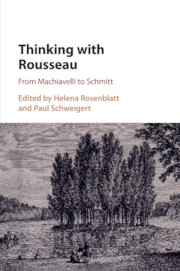Book contents
- Thinking with Rousseau
- Thinking with Rousseau
- Copyright page
- Contents
- Figures
- Abbreviations
- Contributors
- Acknowledgments
- Introduction
- Chapter 1 Rousseau and Machiavelli: Two Interpretations of Republicanism
- Chapter 2 Rousseau and Montaigne: From Enthusiasm to Equanimity
- Chapter 3 Rousseau and Hobbes: The Hobbesianism of Rousseau
- Chapter 4 Rousseau and Montesquieu
- Chapter 5 Rousseau and Mendelssohn: “Enraptured Reason,” Rousseau’s Presence in Moses Mendelssohn’s Thought
- Chapter 6 Rousseau and Smith: On Sympathy as a First Principle
- Chapter 7 Rousseau and A.L. Thomas
- Chapter 8 Rousseau and d’Holbach: The Revolutionary Implications of la philosophie anti-Thérésienne
- Chapter 9 Rousseau and Diderot
- Chapter 10 Rousseau and Kant: Rousseau’s Kantian Legacy
- Chapter 11 Rousseau and Wollstonecraft: Solitary Walkers
- Chapter 12 Rousseau and Madame de Staël: A Surprising Dialogue
- Chapter 13 Rousseau and Proudhon: Human Nature, Property, and the Social Contract
- Chapter 14 Rousseau and Marx: On Human Fulfillment
- Chapter 15 Rousseau and Schmitt: Sovereigns and Dictators
- Bibliography
- Index
- References
Bibliography
Published online by Cambridge University Press: 04 July 2017
- Thinking with Rousseau
- Thinking with Rousseau
- Copyright page
- Contents
- Figures
- Abbreviations
- Contributors
- Acknowledgments
- Introduction
- Chapter 1 Rousseau and Machiavelli: Two Interpretations of Republicanism
- Chapter 2 Rousseau and Montaigne: From Enthusiasm to Equanimity
- Chapter 3 Rousseau and Hobbes: The Hobbesianism of Rousseau
- Chapter 4 Rousseau and Montesquieu
- Chapter 5 Rousseau and Mendelssohn: “Enraptured Reason,” Rousseau’s Presence in Moses Mendelssohn’s Thought
- Chapter 6 Rousseau and Smith: On Sympathy as a First Principle
- Chapter 7 Rousseau and A.L. Thomas
- Chapter 8 Rousseau and d’Holbach: The Revolutionary Implications of la philosophie anti-Thérésienne
- Chapter 9 Rousseau and Diderot
- Chapter 10 Rousseau and Kant: Rousseau’s Kantian Legacy
- Chapter 11 Rousseau and Wollstonecraft: Solitary Walkers
- Chapter 12 Rousseau and Madame de Staël: A Surprising Dialogue
- Chapter 13 Rousseau and Proudhon: Human Nature, Property, and the Social Contract
- Chapter 14 Rousseau and Marx: On Human Fulfillment
- Chapter 15 Rousseau and Schmitt: Sovereigns and Dictators
- Bibliography
- Index
- References
- Type
- Chapter
- Information
- Thinking with RousseauFrom Machiavelli to Schmitt, pp. 295 - 313Publisher: Cambridge University PressPrint publication year: 2017



